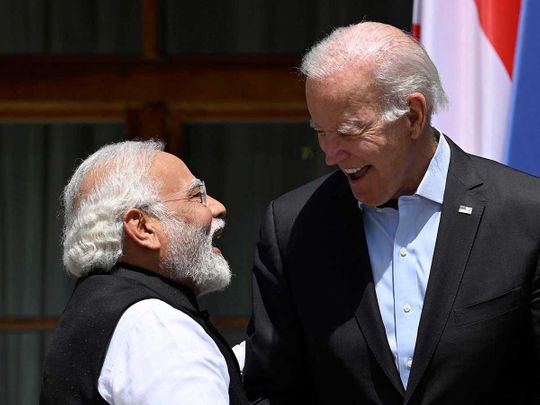
Washington: The US and India are likely to agree to jointly manufacture fighter jet engines in the South Asian nation when Prime Minister Narendra Modi visits Washington next week, a sign of closer military cooperation between the two countries.
The deal is close to the finish line, according to people with knowledge of the matter, who asked not to be identified as the details are confidential. The White House is expected to clear the proposal from General Electric Co., the Massachusetts-based aerospace manufacturing giant, to produce the engines with state-owned Hindustan Aeronautics Ltd. for the Tejas light-combat aircraft, the people said.
Modi starts his first formal state visit on June 21. President Joe Biden will host him for a state banquet, and the Indian leader will also address the US Congress.
A number of the deliverables from Modi’s visit “are not just bullet points on a page,” US National Security Adviser Jake Sullivan said at a conference in New Delhi on Tuesday. “They are fundamentally designed to remove those obstacles in defence trading, in high tech trade, in investment in each of our countries.”
Sullivan is in India this week for meetings with top Indian officials ahead of the Modi visit.
Modi’s visit comes as the Biden administration is working to deepen its relationship with countries that are crucial to counter what it sees as China’s growing threat. In deepening its ties with India the US has also appeared willing to overlook its democratic backsliding as it seeks to pull the nation away from Russia’s sphere of influence.
The jet engine agreement, which would require technology transfer from America, will need approval from the US Congress, where India is banking on the general upswing in ties and bipartisan support to clear remaining hurdles.
Bengaluru-based Hindustan Aeronautics Ltd. and India’s Ministry of External Affairs didn’t immediately reply to requests for comment. The US National Security Council had no comment, and GE declined to comment.
The jet engine agreement would fit in with Modi’s wider push to boost defence manufacturing locally but with technology partnerships with nations that are keen to draw New Delhi into their orbit as Russia’s war in Ukraine drags on into a second year. Earlier this month Germany’s Thyssenkrupp AG’s marine arm and India’s Mazagon Dock Shipbuilders Ltd. signed an initial agreement to jointly build submarines for the Indian navy.
The domestic production of the engines will strengthen India’s fighter jet programme and its air force, whose fleet of rapidly aging Russian fighters need to be replaced. It will also boost Modi’s image as he looks at a third term in office in national elections next year.
The two countries will also likely inch closer to agreements on other defence issues, including India’s purchase of over a dozen armed drones that could exponentially boost its sea and land defence capabilities.
Its current unmanned aerial vehicles can only be used for surveillance and reconnaissance, the people said. As border tensions with China flared in the summer of 2020, New Delhi borrowed two drones MQ 9B drones from the US.
The drones’ deal with the San Diego-based General Atomics has been mired in bureaucratic red-tape for years. In addition the two countries will be discussing jointly building the eight-wheeled armoured personnel carrier “- Stryker “- in India.












